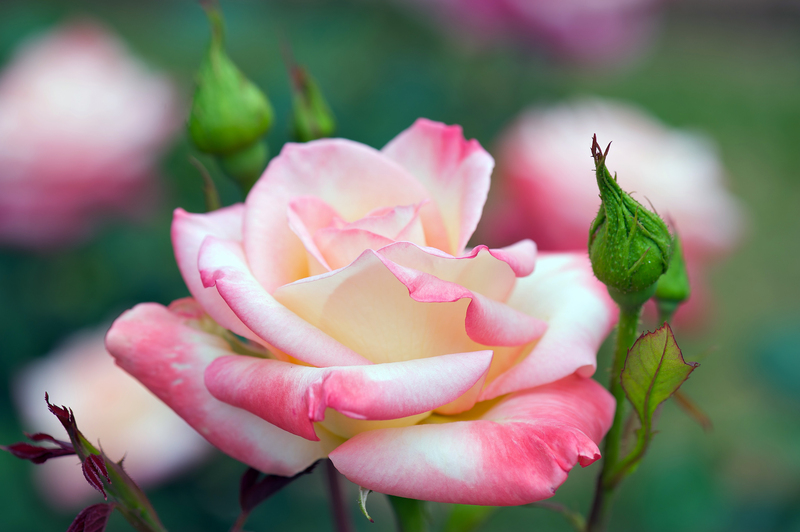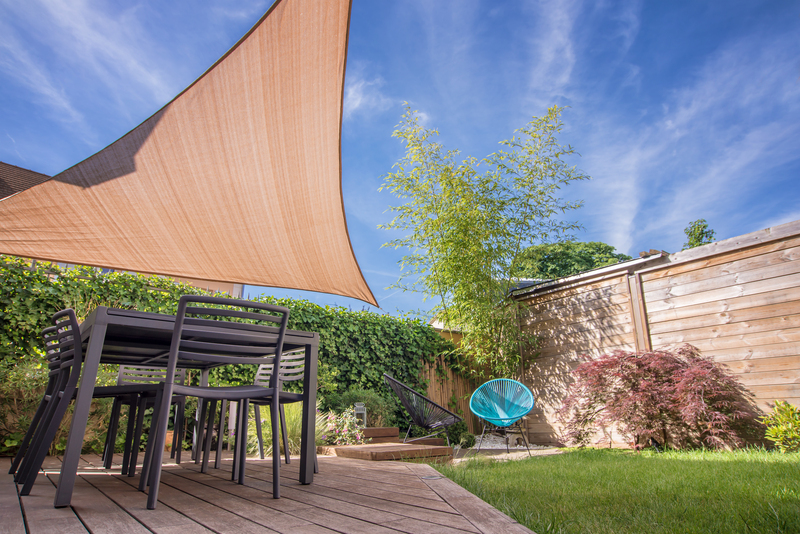Grow a Lush Garden with Your Furry Friends
Posted on 12/09/2025
Grow a Lush Garden with Your Furry Friends: A Complete Guide for Pet Lovers
Imagine a vibrant, lush garden that's a true oasis--filled with flourishing plants, playful companions, and tranquil harmony. If you cherish both your garden and your pets, you may wonder: Is it possible to create a thriving outdoor space that welcomes furry friends without sacrificing beauty or their safety? The answer is a resounding yes!
This comprehensive guide will reveal how to grow a beautiful, lush garden with your pets in mind. You'll discover pet-friendly gardening strategies, the best plants, practical tips to prevent damage, and design ideas to ensure everyone enjoys the garden together. Whether you have curious cats, energetic dogs, or both, you can transform your garden into a safe, shared paradise.
Why Design a Pet-Friendly Garden?
- Safety: Some common plants are toxic to pets. Choosing the right greenery keeps your furry companions out of harm's way.
- Harmony: Designing with pets in mind leads to less stress for both animals and humans, as well as fewer ruined flower beds!
- Enjoyment: A garden tailored for pets and people increases bonding time outdoors and encourages healthy activity for everyone.
- Longevity: Pet-proofing your garden means reduced repairs and more time enjoying your lush, tranquil space.

Pet-Safe Plants for a Lush, Vibrant Garden
Choosing the right plants is the first step to growing a lush garden with your furry friends. Some plants cause mild stomach upset, while others are extremely dangerous. Here's how to select the best ones:
Top Pet-Friendly Plant Picks
- Spider Plant (Chlorophytum comosum): Hardy, lush, and non-toxic to cats and dogs.
- Cat Grass (Dactylis glomerata): Many cats love this, and it helps with their digestion.
- Areca Palm (Dypsis lutescens): A popular lush houseplant that's also safe for pets.
- Boston Fern (Nephrolepis exaltata): Adds abundant greenery without danger.
- Bamboo Palm (Chamaedorea seifrizii): Tall, graceful, and non-toxic.
- Calendula (Calendula officinalis): Beautiful flowers that are safe and even edible.
- Snapdragon (Antirrhinum majus): Colorful and pet-safe blooms.
- Sunflower (Helianthus annuus): Cheerful and non-toxic for gardens with pets.
- Rosemary (Rosmarinus officinalis): Aromatic, useful in the kitchen, and pet-safe.
Plants to Avoid if You Have Pets
- Lilies: Extremely toxic to cats.
- Azaleas & Rhododendrons: Can cause vomiting, diarrhea, or worse.
- Sago Palm: Highly poisonous to dogs and cats.
- Daffodils: All parts are dangerous if ingested.
- Foxglove and Oleander: Contain cardiac glycosides that can be fatal.
Always double-check a plant's toxicity with reputable sources, especially if you're unsure.
Designing a Garden for You and Your Furry Companions
It's not just about plant selection--garden layout makes a huge difference in ensuring peaceful coexistence with your pets. Here are practical strategies to create harmony in your backyard:
1. Create Clear Paths and Defined Zones
- Pet Paths: Animals often patrol the same routes. Lay down mulch, gravel, or flagstones to form designated "pet highways." This encourages your pets to use particular trails, reducing the risk of trampling delicate plants.
- Raised Beds and Barriers: Use raised garden beds, decorative fencing, or rock borders to protect sensitive plantings. This deters digging and gives pets visual boundaries.
- Dog Runs: If you have an energetic dog breed, allocate a dog run or play area with sturdy plants and a shady spot for rest.
2. Design a Digging Area
- Sandpits: Some dogs instinctively love to dig. Introduce a designated digging patch with sand or loose soil, and reward them for using it rather than your flower beds!
- Bury Treats and Toys: Make the digging zone appealing by hiding treats or toys there occasionally.
3. Provide Shade and Shelter
- Trees and Shrubs: Plant leafy trees and large shrubs to create cool, shady areas for your furry friend to escape the sun.
- Pet Houses: Consider a stylish pet house or canopy in the garden for naps and rainy days.
4. Use Pet-Friendly Mulch and Surfaces
- No Cocoa Mulch: Avoid cocoa hull mulch as it is toxic to dogs (contains theobromine).
- Consider Cedar, Pine, or Grass: These mulches are generally safer and less likely to stick to fur.
- Artificial Turf: For low-maintenance, consider areas of well-draining artificial turf that's easy on paws.
5. Water Wisdom
- Pet Fountains and Ponds: Add a water feature like a pet-safe fountain or pond. Dogs love to splash, and running water can attract local birds and beneficial insects.
- Supervise Around Water: Some pets may accidentally fall into ponds, so install shallow zones or gentle slopes to ensure safety.
Training Tips for Growing a Successful Pet Garden
Even with a smartly designed garden, a little training goes a long way to ensure your lush oasis remains both beautiful and pet-safe.
Teach Boundaries
- Physical Barriers: Use low fences, decorative edging, or trellis to mark off-limits areas.
- Verbal Commands: Reinforce commands like "Leave it" or "No digging" when your pet approaches restricted garden zones.
- Consistent Redirects: Gently guide your furry friend to their designated play area or path every time.
Deterring Unwanted Behavior
- Natural Deterrents: Sprinkle citrus peels or commercial pet-repellent granules (pet-safe varieties only!) in vulnerable spots. Cats and dogs often dislike strong citrus scents.
- Positive Reinforcement: Always reward your pets when they use the correct area or display good garden manners.
Low Maintenance Tips for Lush Gardens with Pets
- Hardy, Durable Plants: Choose robust species that bounce back from a little roughhousing, such as daylilies, marigolds, or ornamental grasses.
- Automatic Drip Irrigation: Less standing water means fewer muddy paws and more efficient watering.
- Weed Barriers: Landscape fabric or thick mulch reduces both weeds and the temptation for pet digging.
- Tidy Up Often: Quickly removing pet waste and dead plant material keeps the area sanitary and healthy.
- Compost Carefully: Do not compost pet waste with garden clippings unless you have a dedicated, contained system--some parasites can persist in traditional compost.
Pest Control Without Poison: Keep Everyone Safe
Many pesticides and herbicides are hazardous to animals. To grow a lush garden with your pets and avoid unintended health risks, rely on pet-friendly alternatives:
- Neem Oil: Safe for pets and highly effective against many insects.
- Diatomaceous Earth: A non-toxic powder that deters slugs, ants, and fleas.
- Soap and Water Spray: Simple solution for aphids and mites with no harmful residue.
- Companion Planting: Incorporate marigolds, nasturtiums, and basil to repel problem bugs naturally.
- Regular Hand-Picking: Inspect your plants for beetles or caterpillars and remove them manually.
Best Design Ideas for a Pet-Paradise Garden
| Idea | Benefits |
|---|---|
| Hidden Paths and Mazes | Stimulates curiosity and provides a playful space for cats and dogs to explore safely. |
| Raised Observation Deck | Install a low platform for dogs to survey their territory or for cats to bask in the sun. |
| Herb Spiral | Grows culinary and medicinal herbs (rosemary, thyme, parsley), most of which are pet-safe and provide interesting scents. |
| Climbing and Scratching Posts | Integrate natural wood logs or purpose-built features for cats to climb and scratch, keeping them away from prized plants. |
| Pet-Friendly Pond | Include shallow ledges and circulating water, with no toxic water lilies or chemicals, for safe wading or drinking. |

Frequently Asked Questions: Pet-Friendly Lush Gardening
Can I create a lush vegetable garden if I have pets?
Yes! Many vegetables, such as carrots, peas, and lettuce, are safe if your pets take a nibble. However, nightshades like tomatoes and potatoes contain solanine and should be fenced off. Always check plant toxicity before planting edibles your pets can access.
Are organic fertilizers safe for dogs and cats?
*Not all organic fertilizers are pet-safe.* Those containing blood meal, bone meal, or fish emulsion can tempt dogs to dig and even cause stomach upset if ingested. Opt for well-composted manure, seaweed, or pet-approved commercial organic fertilizers and store them securely.
How can I reduce digging or lawn damage?
Try exercising your dog before garden time, providing dedicated digging spots, and choosing tough groundcovers like clover or buffalo grass to withstand some wear and tear. Regular reseeding and repair will also help maintain your lush landscape.
Should my indoor cats enjoy the garden?
Supervise your cats outside or try a "catio" (cat patio)," which is an enclosed mesh outdoor area that lets kitties experience nature safely without risk of escape or exposure to hazards.
Final Thoughts: Gardening in Harmony With Your Furry Friends
Growing a lush garden with your pets is absolutely achievable. By focusing on non-toxic plants, thoughtful design, pet-safe gardening practices, and plenty of training and positive reinforcement, you create a shared sanctuary filled with color, scent, relaxation, and endless play.
A well-planned pet-friendly lush garden is not only a feast for the eyes but also a haven for the animals you love. So grab your gloves, invite your four-legged companions outside, and nurture a garden where everyone can thrive together!
Ready for More?
Sign up for our newsletter for pet-friendly gardening inspiration, reach out with your questions, or share photos of your own lush garden with pets--you could be featured in our next community spotlight!
Latest Posts
Transform Your Garden with Unique Hedge Shapes
Secrets to Keeping Your Orchids Blooming
Refining Your Garden with Hedge Trimming Techniques

